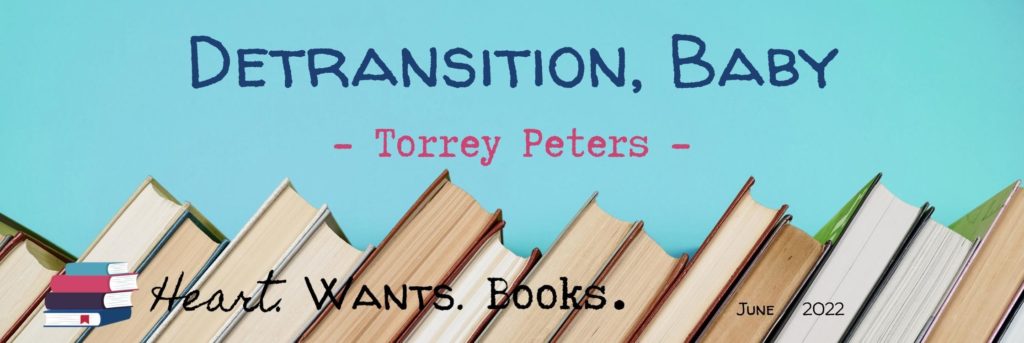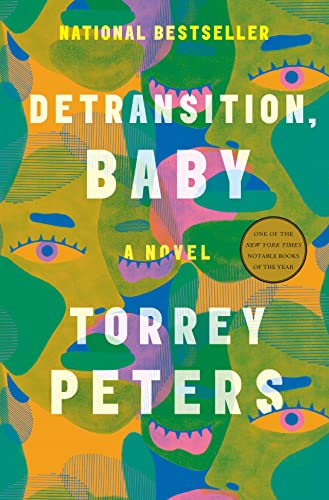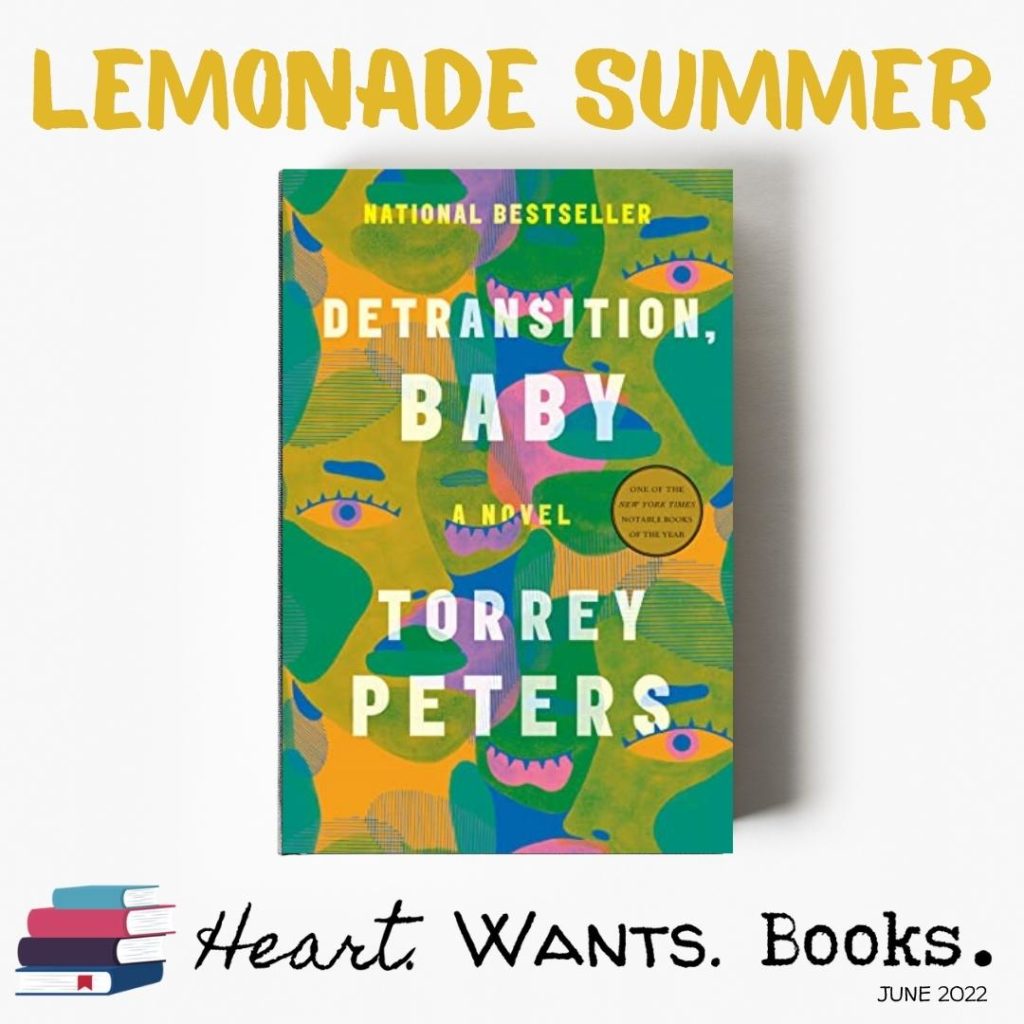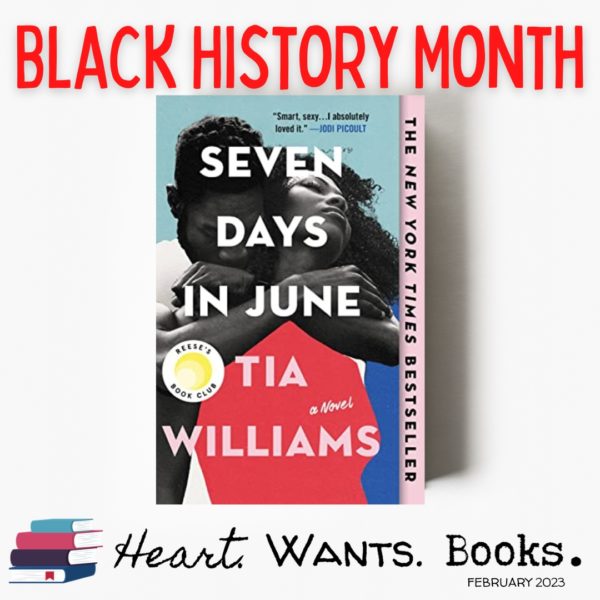Detransition, Baby by Torrey Peters June 9, 2022


The following post includes affiliate links. More details here. As you’re doing your Amazon shopping, we’d be ever so grateful if you’d use our affiliate link to do so as it helps pay the bills around here!
Readers, this is going to shock some of you, but nous sommes fini with Julia Quinn’s The Duke and I, yes, both of us, and it’s not even Friday yet! As such, we are beyond ready to chat with you about it on Friday, June 10, at 7:30pm CST. In order to not be mentioned by Lady Whistledown, kindly répondez s’il vous plaît ici so we know to expect you, and send you the link on Friday!
Sometimes not remembering things is a whole situation, and other times it just isn’t. I’m sure I’d read the marketing copy describing Detransition, Baby by Torrey Peters, but when I just reread it (to ensure I minimize potential spoilers that aren’t in it), I was glad I didn’t remember. Let’s start with structure this time. The structure is back and forth in time, as related to conception of the (presumably) titular baby. While I have been bothered by this in other books (*cough* All the Light We Cannot See), it really works here, likely because it’s either right around conception or it’s backstory and it’s all really clear where we are in the tale based on what pieces of themselves our main characters are sharing with us. This feels like a great place for trigger warnings, because yes there are several. There is some violence against the characters, there is an unexpected pregnancy, and discussion of whether or not to abort it, and there are extramarital affairs. The pregnancy is central to the story, so if reading a book about that isn’t for you, please take care of yourself in your reading life!

The structure is interesting, but the story is what makes Detransition, Baby so amazing. Ames works for Katrina, but they’ve been having a casual affair and Katrina becomes with child (yup, that’d be from the back to back regency romances I just read, you’re welcome!) and doesn’t want to raise a child alone. Ames, who previously lived as Amy, has detransitioned and doesn’t know that he can be a “father” and wants to be a bit more creative about creating their family unit, so he asks his ex, Reese, if she’d also like to help parent this child. Sound …creative? Well, yes, yes it is. This book follows these three potential parents, but mostly Reese and Ames, as they come to grips with what it might mean to be a parent, what they really want, and ultimately, who they are. Much, but not all is revealed about Reese and Amy back when they were together, and some about why they went their separate ways, and also how Ames ended up with Katrina. The story is complex, nuanced, and layered, and it includes a lot of references to New York and the transgender community there. While I do know a few trans people, I wouldn’t say that I know the community, and I found that aspect a very interesting window to look into. Just as one trans person doesn’t represent them all, one author’s fictional writing on the trans community is just that, one take, but it still presented some new to me perspectives for which I am grateful.
I’m giving Detransition, Baby by Torrey Peters four solid stars. The story is intriguing, the structure made it more fun, and the writing was very solid. This is a stellar debut and I’m looking forward to seeing what Peters does next. I don’t know that I’ll reread it, but I definitely will recommend Detransition, Baby to readers interested in the dynamics of trans women, particularly as related to parenting, and the struggles of someone who does not identify with their assigned gender. If these are not topics of interest to you, please feel welcome to skip this title. While I have never had such an experience, I was delighted to be invited in by Peters and to read about it on the fictional page. I am so grateful for authors and other teachers who are willing to share with those of us who have different lived experiences and want to understand more.
What is a book that has enlightened you to a lived experience that is different from your own?
~Nikki

I love it when a debut novel exceeds expectations. Not only does Detransition, Baby by Torrey Peters get four stars from Nikki, it also won the 2021 PEN/Hemingway award for debut fiction. It was also on national bestseller lists and marked as one of the New York Times notable books of the year. Additional critical success had it being a finalist for the National Book Critics Circle Awards, a finalist for the Brooklyn Public Library Award, and longlisted for the 2021 Women’s Prize for Fiction. This is additionally important because there was negative and very public criticism regarding Peters’ eligibility for the Women’s Prize for Fiction because of her publicly identifying as a trans woman, meaning she was assigned male at birth. Other authors, nominees, and the committee itself made statements condemning the detractors and supporting her and her work. Detransition, Baby has seen such popular acclaim that previously published novellas are being re-released in a new collection by Random House in 2023. Peters has an MFA from the University of Iowa and a MA in Comparative Literature from Dartmouth College. She rides a pink motorcycle (I am ridiculously jealous of her for that!) and lives in Brooklyn… and an off-grid cabin in Vermont.
Now, I don’t want you to begin to think that this debut novel only met expectations for me, when it most certainly exceeded them. I have feelings of excitement over many of the same things Nikki does, the writing, the characterizations, the structure (every chapter is given in time increments from conception, going either forward or backward), the difficult themes and real human emotion brought to the page and straight into your heart. The real heart of Detransition, Baby, and really any work of fiction, are the intimacies and intricacies of human relationships. Not only do we get the different and difficult family relationship of Reese, Ames, and Katrina, but some of the defining relationships for each of them before the possibility of their collective parenthood. Not just romantic relationships, but friendships and cohabitation relationships. Reese’s friend and roommate Iris is honest and unapologetic about her life and the lives of those she comes into contact with, someone might call that judgemental, and you’d probably be right.
One of my favorite passages is this paragraph from page 9. And maybe it’s because I just finished a first time watch of Sex and the City from season one episode one, through two movies, and the entire first season of the new continuation series And Just Like That, but it feels like a truth of womanhood in my heart.
The Sex and the City Problem wasn’t just Reese’s problem, it was a problem for all women. But unlike millions of cis women before Reese, no generation of trans women had ever solved it. The problem could be described thusly: When a woman begins to notice herself aging, the prospect of making some meaning out of her life grows more and more urgent. A need to save herself, or be saved, as the joys of beauty and youth repeat themselves to lesser and lesser effect. But in finding meaning, Reese would argue—despite the changes wrought by feminism—women still found themselves with only four major options to save themselves, options represented by the story arcs of the four female characters of Sex and the City. Find a partner, and be a Charlotte. Have a career, and be a Samantha. Have a baby, and be a Miranda. Or finally, express oneself in art or writing, and be a Carrie. Every generation of women reinvented this formula over and over, Reese believed, blending it and twisting it, but never quite escaping it.
There’s really no other thing that I can say other than I have felt I needed to become all of those story arcs at some time or other in my 37 years on this planet. Probably all in the past year alone. And that’s what Peters has done in this four star book for me. Made every character’s decision or feelings relatable in a way that it could have just been a piece of me she wrote about. That’s the power of story and how it makes us feel empathy and connection to other people, who might not physically be just like us. They’re certainly all emotionally just like us, and we would do well to remember that.
What are you reading this June to celebrate Pride Month?
~Ashley

PLEASE SUPPORT US WHEN YOU SHOP BY FIRST CLICKING ON THE IMAGES BELOW:








